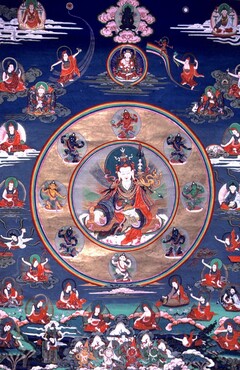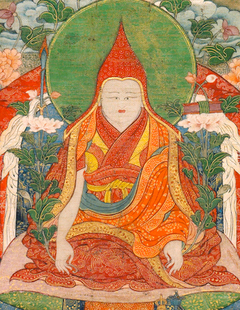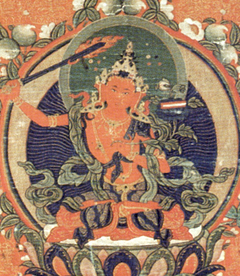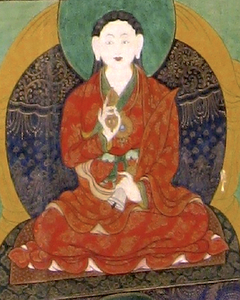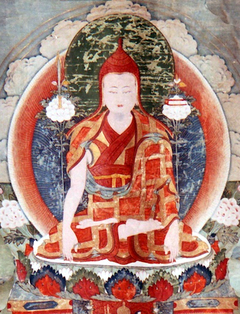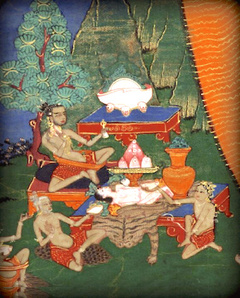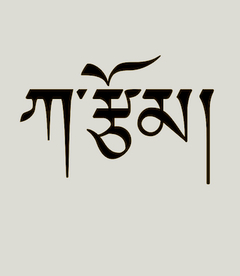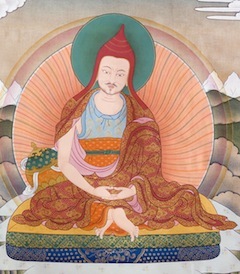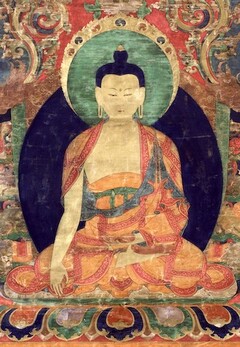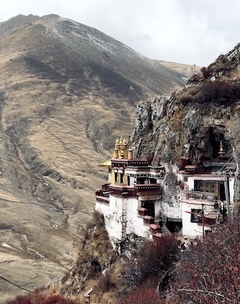
Revised and updated here for our 21st anniversary (🎉), this is an expanding series of popular quotations previously published on our former sister site, Lotsāwa School, as A Compendium of Quotations.
This concise daily practice of Rigdzin Düpa, the inner guru sādhana of the Longchen Nyingtik, was compiled by the Second Penor Rinpoche, who, while integrating the Longchen Nyingtik into the Palyul tradition, composed many texts for the cycle. Here he combines the main terma of Rigdzin Düpa with the longevity practice "The Vase of Immortal Life".
This opening section of Longchenpa's history of Lama Yangtik includes a discussion of the direct wisdom-mind transmission of the victorious ones from dharmakāya to sambhogakāya to nirmāṇakāya, the last of which includes the three supreme blessing emanations and the sublime wisdom emanations, such as the twelve Dzogchen teachers.
Guru Tashi wrote this catalogue to the Khandro Yangtik collection following its publication in Derge 1808. The famed historian, who was instructed by Queen Tsewang Lhamo to proofread the texts, begins by discussing the historical origins of both the Khandro Nyingtik and Khandro Yangtik, then provides some information about the publication process, and finally lists the contents of the collection.
The story of Bhikṣuṇī Fa Kong, a diligent nun in the mid-Tang Dynasty (618–907) who encountered Mañjuśrī at the holy site of Wutai Shan.
Other recent additions
An aspiration to accomplish the various phases of Trekchö practice associated with the Ati Zabdön, a Dzogchen cycle discovered by Minling Terchen Gyurme Dorje (1646–1714), the author's father.
In this catalogue to the Derge edition of Longchenpa's miscellaneous writings, Jamyang Khyentse Wangpo lists the collection's contents in nine sections. The author bases his text on Longchenpa's own longer Storehouse of Jewels catalogue, but he lists only the extant works, which he himself had searched for throughout Tibet.
A word-for-word commentary (tshig ’grel) on the hidden meaning of Rigdzin Jigme Lingpa’s renowned "Song of the Feast" (tshogs glu). Through vivid poetic analogies, this text expresses the profound realization of the vajra body, speech, and mind as attained on the Vajrayāna path, particularly through advanced Anuyoga yogic practices, which form a cornerstone of the gaṇacakra.
Latest Topic Introductions
A brief historical introduction to the Thirteen Major Texts (gzhung chen bcu gsum), Indian treatises taught and popularized by the great Khenpo Shenpen Nangwa (1871–1927).
A short historical introduction to the form of acrostic poetry known as abecedarian composition (ka rtsom).
Highlights from Archive
Translated from an audio recording. Zenkar Rinpoche explains the various methods and traditions of teaching the Bodhicaryāvatāra, especially that of Dza Patrul Rinpoche (1808–1887) and his followers, who often guided students through the text experientially.
Trulshik Rinpoche compiled these brief verses of praise and mantras so that all those connected with him could recite them daily or on special occasions. The deities included are Buddha Śākyamuni, Vajrasattva, Amitāyus, Amitābha, Ratnaśikhin, Medicine Buddha, Maitreya, Avalokiteśvara, Mañjuśrī, Vajravidāraṇa, Vijayā, Tārā, Guru Padmasambhava, and the union of Hayagrīva, Vajrapāṇi and Garuḍa.
Featured Topic
Texts on the theme of retreat and solitude, including advice for three-year retreatants and a guide to the optimal environments and dwelling places for cultivating meditative concentration.
11 texts
* Lotsāwa ལོ་ཙཱ་བ་; lo tsā ba n. Title used for native Tibetan translators who worked together with Indian scholars (or paṇḍitas) to translate major buddhist texts into Tibetan from Sanskrit and other Asian languages; it is said to derive from lokacakṣu, literally "eyes of the world". See also paṇḍita.
Lotsawa House is registered in the UK as a Community Interest Company (#14358325), a category of company which exists primarily to benefit a community or with a view to pursuing a social purpose, with all profits having to be used for this purpose.

